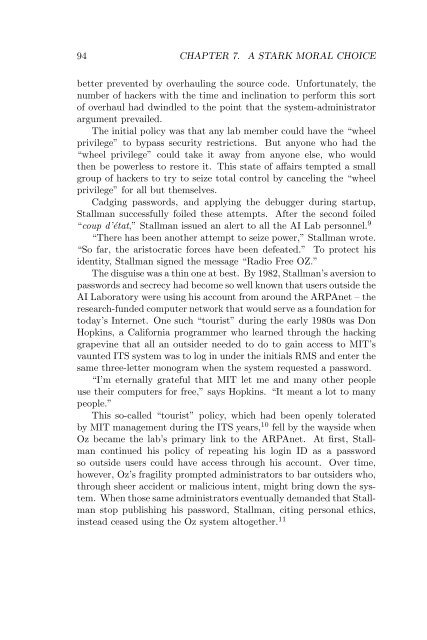Create successful ePaper yourself
Turn your PDF publications into a flip-book with our unique Google optimized e-Paper software.
94 CHAPTER 7. A STARK MORAL CHOICE<br />
better prevented by overhauling the source code. Unfortunately, the<br />
number of hackers with the time and inclination to perform this sort<br />
of overhaul had dwindled to the point that the system-administrator<br />
argument prevailed.<br />
The initial policy was that any lab member could have the “wheel<br />
privilege” to bypass security restrictions. But anyone who had the<br />
“wheel privilege” could take it away from anyone else, who would<br />
then be powerless to restore it. This state of affairs tempted a small<br />
group of hackers to try to seize total control by canceling the “wheel<br />
privilege” for all but themselves.<br />
Cadging passwords, and applying the debugger during startup,<br />
Stallman successfully foiled these attempts. After the second foiled<br />
“coup d’état,” Stallman issued an alert to all the AI Lab personnel. 9<br />
“There has been another attempt to seize power,” Stallman wrote.<br />
“So far, the aristocratic forces have been defeated.” To protect his<br />
identity, Stallman signed the message “Radio Free OZ.”<br />
The disguise was a thin one at best. By 1982, Stallman’s aversion to<br />
passwords and secrecy had become so well known that users outside the<br />
AI Laboratory were using his account from around the ARPAnet – the<br />
research-funded computer network that would serve as a foundation for<br />
today’s Internet. One such “tourist” during the early 1980s was Don<br />
Hopkins, a California programmer who learned through the hacking<br />
grapevine that all an outsider needed to do to gain access to MIT’s<br />
vaunted ITS system was to log in under the initials RMS and enter the<br />
same three-letter monogram when the system requested a password.<br />
“I’m eternally grateful that MIT let me and many other people<br />
use their computers for free,” says Hopkins. “It meant a lot to many<br />
people.”<br />
This so-called “tourist” policy, which had been openly tolerated<br />
by MIT management during the ITS years, 10 fell by the wayside when<br />
Oz became the lab’s primary link to the ARPAnet. At first, Stallman<br />
continued his policy of repeating his login ID as a password<br />
so outside users could have access through his account. Over time,<br />
however, Oz’s fragility prompted administrators to bar outsiders who,<br />
through sheer accident or malicious intent, might bring down the system.<br />
When those same administrators eventually demanded that Stallman<br />
stop publishing his password, Stallman, citing personal ethics,<br />
instead ceased using the Oz system altogether. 11


